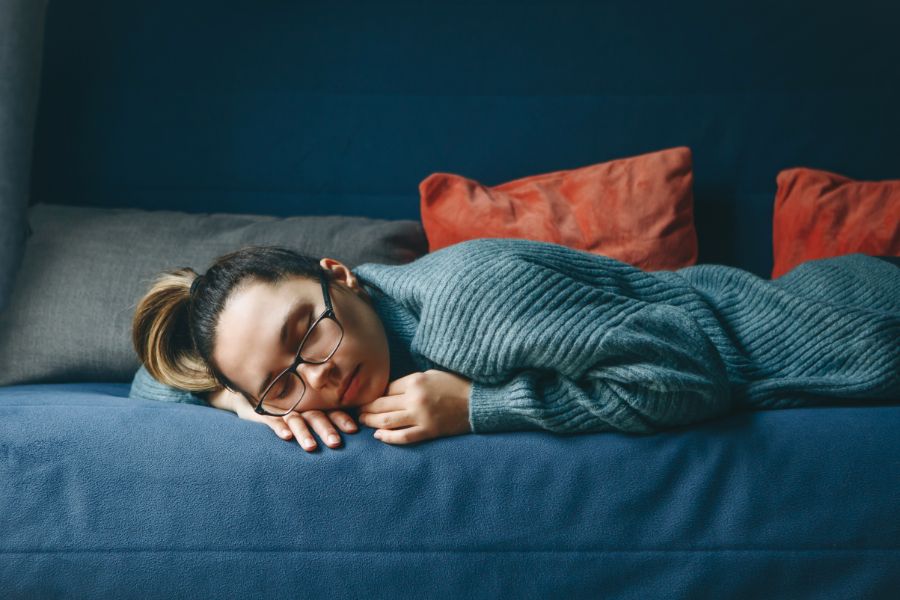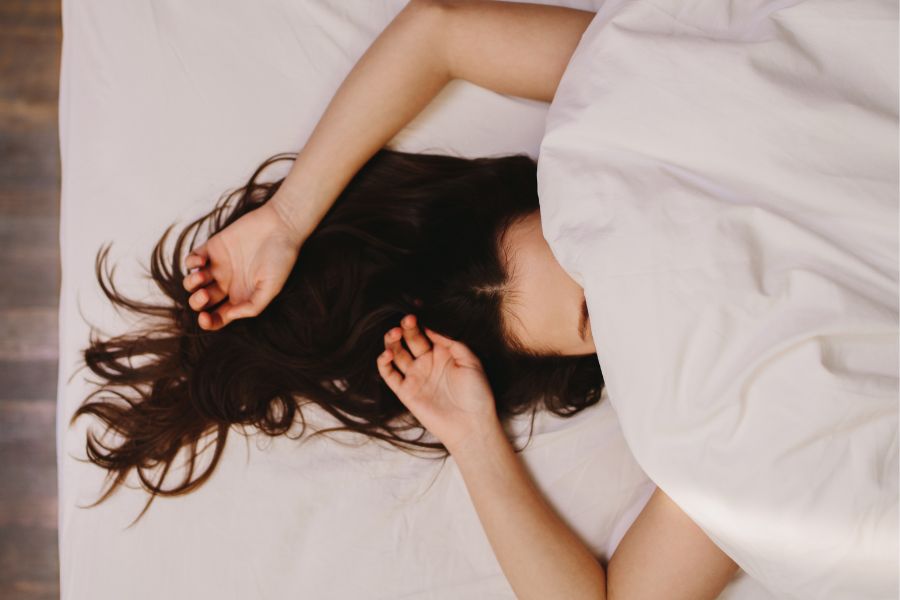Getting a good night’s sleep is so important, and we can help improve our sleep by doing many things, including choosing the right pillow and mattress. However, what happens if you sleep without a pillow? Are there any benefits or is it something to be avoided?
To answer questions like these and more, in this post, we have all the info you need about sleeping without a pillow.
Is It Better to Sleep without A Pillow?

You may have heard some people say that sleeping without a pillow is better than sleeping with one, but why would this be?
One suggestion is that sleeping without a pillow can help improve your sleeping posture, the idea being that pillows force you into an unnatural position.
A result of this, so the thinking goes, sleeping without a pillow can also help reduce neck pain by reducing the stress on your neck as you sleep.
Finally, some people claim that sleeping without a pillow even has benefits for your skin and hair.
So is there any truth to these ideas?
Most of the time, the answer is no, but in certain specific cases, sleeping without a pillow may be beneficial – and to understand why, first, we need to talk about why we use pillows and how they affect our posture as we sleep.
Why Do We Use Pillows?
The simple answer to why we use pillows is that most people find it more comfortable to sleep with them, but more than this, pillows are used because they help us sleep in a healthier position.
When we sleep, the best posture is one that aligns our head, neck and spine while reducing any excess pressure or strain, so we use pillows to help maintain this posture.
In addition, placing pressure on our necks or backs while we sleep due to our sleeping position can lead to neck or back pain – so pillows are used to reduce this pressure, thus reducing the risk of suffering from such pain.
From this, it follows that if we sleep without a pillow, we remove the support they provide, which negatively affects our posture and puts us at risk of suffering from neck and back pain.
However, there’s more to it than this, because not everyone sleeps in the same position.
Some people are back sleepers, some sleep on their sides and others prefer to sleep on their stomachs, and how pillows affect our posture depends to a great extent on which position we sleep in – so let’s talk about that now.
How Pillows Affect Different Sleeping Positions
Depending on our sleeping position, we need pillows to offer different types of support, as follows:
Back Sleepers
If you sleep on your back, a pillow helps maintain the correct spinal alignment. When you lay your head on the pillow, your weight is distributed evenly and naturally over your back, and pressure on your neck is relieved.
At the same time, the pillow needs to hold your head in place so your face is pointing up – because if your head turns to the side as you sleep, your neck and spine will not be aligned, and your neck will be twisted into an unnatural position that could lead to neck pain.
Having your head tilted slightly forward can also help reduce the risk of sleep apnea, another reason why back sleepers need a pillow to support their head.
For back sleepers, the best type of pillow is a medium loft one with a good amount of firmness to hold the head at the correct height without allowing it to roll to the sides during sleep.
Side Sleepers
For side sleepers, the pillow is necessary to support the head and to keep the spine and the neck aligned.
If a side sleeper has a pillow that is too low or too high, it will cause their neck to be bent as they sleep, which is not a healthy position and can potentially lead to neck pain.
As a result, side sleepers need the highest types of pillows (although not too high), and most side sleepers prefer relatively firm pillows. This is because these types can hold the head at the correct height for the head, neck and spine to be correctly aligned.
Stomach Sleepers
When sleeping on your front, you need to turn your head to the side, which is already an unnatural position that twists your neck and spine.
However, if you sleep on your front on a pillow, it can twist your neck back even further, making it even more unnatural and placing you at even more risk of neck and back pain.
As a result, the best type of pillow for a front sleeper is a soft, low-loft pillow that allows them to sleep with their head close to the mattress.
It’s also possible that for front sleepers, sleeping without a pillow may be beneficial – so now let’s think about how sleeping without a pillow can affect people who sleep in these different positions.
How Sleeping without A Pillow Affects Different Sleeping Positions
Back
If you sleep on your back without a pillow, your head will tilt too far back, creating an unnatural curvature for your neck and spine, which may result in neck or back pain.
Furthermore, without a pillow, it’s hard to maintain the correct sleeping position with your face pointing up. It’s easy for your head to roll to the side, which may cause you to wake up – or if you don’t wake up, it can easily lead to neck pain or a stiff neck in the morning.
All this means if you are a back sleeper, sleeping without a pillow is not recommended, either for your posture or for the relief of neck or back pain. If you suffer from neck or back pain, sleeping without a pillow is likely to make it worse.
Side
If a side sleeper tries to sleep without a pillow, their neck will be bent at an unnatural angle, placing extra stress on the neck. This can easily lead to a stiff neck and possibly neck and back pain.
As a result, side sleepers are not recommended to sleep without a pillow.
Stomach
Although sleeping on your stomach means your head is turned to the side and your neck is twisted at an unnatural angle, if a stomach sleeper sleeps without a pillow, it can potentially reduce the amount the neck is twisted, possibly reducing neck and back pain.
Is Sleeping without A Pillow Good for Posture or Neck Pain?
What all this tells us is that while for back and side sleepers, pillows are necessary for maintaining the correct sleeping posture, there may be some benefits for front sleepers to sleep without a pillow.
So far, most research into the effect of pillows on sleep, posture and neck pain has focused on finding the best type of pillow for each sleeping position rather than investigating the advantages of sleeping with no pillow.
However, it seems logical that in some cases, sleeping without a pillow may be beneficial for those who sleep on their stomachs.
Can Sleeping without A Pillow Help with Wrinkles or Hair?
While there may be clear benefits for stomach sleepers to ditch their pillow for reasons of posture or pain relief, the claims that it can be beneficial to sleep without a pillow for your hair or your skin are on shakier ground.
Some preliminary research has been carried out on the question of whether sleeping on a pillow can cause skin distortion due to facial compression during sleep, but the evidence is far from conclusive.
Some people claim anecdotally that pillows cause their hair to become dry or frizzy, and this may depend on the material the pillowcase is made of. For example, cotton pillowcases may absorb the natural oils from hair, causing it to become dry.
There is a suggestion that silk pillowcases may be better than cotton pillowcases in this respect.
However, for back or side sleepers, it’s not recommended to sleep without a pillow for the supposed benefits to skin and hair because these possible benefits are outweighed by the negative effects it will have on sleeping posture.
How Does Sleeping without A Pillow Affect Snoring?
Another question about sleeping without a pillow concerns snoring – how will getting rid of your pillow affect this?
Snoring occurs when our bodies relax while we sleep. When this happens, air passes through our soft palate, tonsils, adenoids and tongue, and if there is some kind of partial blockage, the tissues there vibrate.
If you sleep on your side or your back, sleeping with a pillow raises your head and aligns your head, neck and spine, helping to keep the airways clear. As a result, if you sleep in these positions, using the correct pillow should help reduce snoring.
However, if you sleep on your side or back with no pillow, your neck will be bent and your head may sag or tilt back. This will cause your airways to become more restricted, making you snore more, so for back and side sleepers, sleeping with a pillow is better to minimize snoring.
Conversely, if you sleep on your front, if anything, the opposite is true. Sleeping with no pillow will help keep your airways open since it can help reduce the twist in your neck – or at the very least, it won’t make things any worse.
At the same time, if you sleep on your front with your head on a medium or high pillow, it will twist your neck even further, potentially increasing the likelihood that you will snore.
As a result, for stomach sleepers, the best option if you snore is to sleep on a low, thin pillow – or to sleep with no pillow at all.
Should You Sleep Without A Pillow?

So having looked at the pros and cons of using pillows for back sleepers, side sleepers and stomach sleepers – and having talked a bit about the possible benefits of not using a pillow for hair and skin – we can now think about whether sleeping without a pillow is recommended.
As we’ve seen, for back and side sleepers, using a pillow is important because it helps maintain a healthy sleeping posture that supports the head while keeping the head, neck and spine aligned.
For people who sleep in these positions, sleeping without a pillow would result in a less healthy sleeping posture and could even lead to neck and back pain, so sleeping without a pillow is not recommended.
Also, since there are no proven benefits to skin or hair from sleeping without a pillow, it is not recommended to switch to pillowless sleep for those reasons either.
However, for those who sleep on their stomach, there is an argument that sleeping without a pillow can reduce the effects of sleeping with your head twisted to the side.
As a result, sleeping with no pillow may increase comfort, improve posture and reduce neck stiffness or neck and back pain caused by sleeping on a pillow.
Read More:
FAQs
Does Sleeping without A Pillow Help Your Posture?
Sleeping with a pillow is necessary for those who sleep on their back or their side since the pillow helps you maintain a good sleeping posture.
However, for those who sleep on their stomach, sleeping without a pillow may help improve their posture.
What Are the Side Effects of Sleeping Without A Pillow?
For back and side sleepers, sleeping without a pillow may result in a stiff neck or neck and back pain from sleeping in an unnatural and unhealthy position. It may also decrease the quality of sleep due to the lack of comfort.
However, stomach sleepers may not experience any negative side effects and may even benefit from sleeping without a pillow.
Is Sleeping without A Pillow Bad?
Whether sleeping without a pillow is good or bad depends on the position you sleep in.
If you are a back or side sleeper, sleeping without a pillow is generally considered bad because it forces you to sleep in an unnatural position that places extra stress on your neck.
However, sleeping without a pillow is not bad for stomach sleepers since it reduces the stress on the neck caused by sleeping with a pillow.
Are Pillows Bad for Your Neck?
Pillows are not bad for your neck in themselves, but sleeping with the wrong kind of pillow can be bad for your neck.
For example, a side sleeper who has a soft, thin pillow will not receive the support they need for their head. This will cause them to sleep with their neck bent, and this may lead to a stiff neck or neck and back pain. Instead, this kind of sleeper requires a higher, firmer pillow.
However, if a stomach sleeper slept on a high, firm pillow designed for a side sleeper, it would cause their neck to be even more twisted than usual, also leading to a stiff neck and possible neck and back pain.
Can Sleeping without A Pillow Reduce Neck Pain?
Sleeping without a pillow usually won’t help back or side sleepers who suffer from neck pain – although finding a more suitable mattress may help.
However, for stomach sleepers, sleeping without a pillow may help reduce neck stiffness or pain, so it’s something that’s worth trying.
Is There Any Evidence that Sleeping without A Pillow Can Reduce Neck Pain?
Not really. The amount of scientific research that has been done in this area is limited, and most of the evidence is anecdotal.
However, it seems logical that since sleeping without a pillow reduces the amount of pressure on stomach sleepers’ necks, it could have some benefits for these people.
Sleeping without A Pillow Can Be an Option for Stomach Sleepers
While sleeping without a pillow is not recommended for back or side sleepers and hasn’t been shown to provide benefits for hair or skin, it’s possible that it may improve sleeping posture and reduce neck and back pain in stomach sleepers, so for them, it’s an option to consider.
